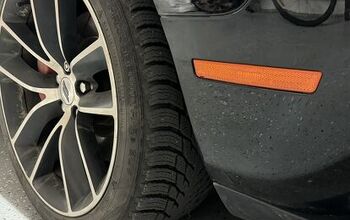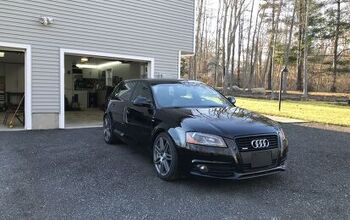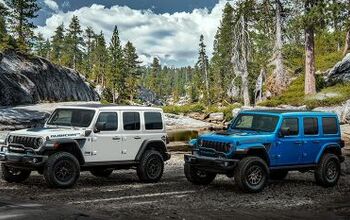Team Trump Eases Demands on NAFTA's Regional Auto Content

The United States is softening the contentious automotive content requirement mandates pushed by the Trump administration as part of NAFTA renegotiation talks. While the demand is only one of many asks coming from the U.S., both Canada and Mexico said forcing 85 percent of a vehicle’s overall content to be sourced from the three countries (in order to side-step tariffs) was a nonstarter. Over the past year, the issue became a major sticking point in the trade talks — hindering progress and possibly dooming them to failure.
While Trump’s intent was to bolster domestic employment by incentivizing North American parts suppliers, automakers expressed concerns and noted it was often difficult to reach the current threshold of 62.5 percent.
The United States has now proposed applying the new content requirement only to major components (like a vehicle’s powertrain) while leaving fasteners (nuts, bolts, etc.) alone. As an automobile is made up of tens of thousands of individual parts, deciding what should and should not be counted will make a big difference. Still, some manufacturers are likely to have difficulty meeting the proposed content requirement on critical engine components.
According to Bloomberg, no agreement has been reached thus far and Mexico and Canada could still reject the new proposal. But it’s a step toward compromise — a tactic which none of the member states have really taken advantage of during negotiations.
Despite trade talk updates taking on a more optimistic tone since the start of 2018, very little progress has been made. The three countries are still a long way from reaching an agreement and time is quickly running out. While the U.S. takes a softer NAFTA stance in the wake of Donald Trump’s global trade issues, Mexico’s presidential election is fast approaching. Leftist frontrunner Andres Manuel Lopez Obrador has already suggested suspending trade talks until after the July election and his selection for foreign minister, Hector Vasconcelos, has already said the death of NAFTA wouldn’t be “the end of the world.” There is a very strong chance that, if negotiations aren’t settled before July, a newly elected Lopez Obrador may decide to suspend them indefinitely.
Currently, the United States takes about 80 percent of Mexico’s exports. A breakdown in trade would likely be disastrous for both countries in the short term. But most Mexican politicians, including Lopez Obrador and Vasconcelos, have said it would be important to maintain a working relationship with the U.S. while pursuing additional trade opportunities in Europe and Asia.
Meanwhile, Canadian ambassador David MacNaughton painted a similarly bleak picture for NAFTA. “I don’t know what an agreement in principle looks like, really,” MacNaughton told reporters Wednesday in Toronto. “There’s still lots of issues. There’s differences of opinion and we’re going to work hard to try and narrow down the gaps and get to as much of an agreement as we possibly can.”
For automakers, a winning NAFTA strategy is one that minimizes import/export hurdles, is easy to understand, and remains logistically feasible. But most manufacturers rely heavily on foreign suppliers and would have difficulty meeting the 85 percent quota — domestic assembly frequently does not mean domestically sourced parts.
“We appreciate U.S. negotiators’ goal to support American jobs,” Ford spokeswoman Christin Baker told Bloomberg. “However, there is a concern that significant changes to the rules of origin would not achieve that shared goal. We look forward to seeing the official details, and we continue to urge negotiators to include enforceable rules prohibiting currency manipulation in a revised NAFTA.”
As the general tone surrounding the talks loses some of its negativity, most representatives and spokespeople are careful not to come across as overly optimistic. Kelly Craft, the U.S. ambassador to Canada, may have been the only official with an upbeat voice this week. “We all want a good outcome … There’s no reason to tear NAFTA down,” she said recently in Toronto. “I’ve got every confidence that together, we will fix NAFTA.”

A staunch consumer advocate tracking industry trends and regulation. Before joining TTAC, Matt spent a decade working for marketing and research firms based in NYC. Clients included several of the world’s largest automakers, global tire brands, and aftermarket part suppliers. Dissatisfied with the corporate world and resentful of having to wear suits everyday, he pivoted to writing about cars. Since then, that man has become an ardent supporter of the right-to-repair movement, been interviewed on the auto industry by national radio broadcasts, driven more rental cars than anyone ever should, participated in amateur rallying events, and received the requisite minimum training as sanctioned by the SCCA. Handy with a wrench, Matt grew up surrounded by Detroit auto workers and managed to get a pizza delivery job before he was legally eligible. He later found himself driving box trucks through Manhattan, guaranteeing future sympathy for actual truckers. He continues to conduct research pertaining to the automotive sector as an independent contractor and has since moved back to his native Michigan, closer to where the cars are born. A contrarian, Matt claims to prefer understeer — stating that front and all-wheel drive vehicles cater best to his driving style.
More by Matt Posky
Latest Car Reviews
Read moreLatest Product Reviews
Read moreRecent Comments
- Corey Lewis It's not competitive against others in the class, as my review discussed. https://www.thetruthaboutcars.com/cars/chevrolet/rental-review-the-2023-chevrolet-malibu-last-domestic-midsize-standing-44502760
- Turbo Is Black Magic My wife had one of these back in 06, did a ton of work to it… supercharger, full exhaust, full suspension.. it was a blast to drive even though it was still hilariously slow. Great for drive in nights, open the hatch fold the seats flat and just relax.Also this thing is a great example of how far we have come in crash safety even since just 2005… go look at these old crash tests now and I cringe at what a modern electric tank would do to this thing.
- MaintenanceCosts Whenever the topic of the xB comes up…Me: "The style is fun. The combination of the box shape and the aggressive detailing is very JDM."Wife: "Those are ghetto."Me: "They're smaller than a Corolla outside and have the space of a RAV4 inside."Wife: "Those are ghetto."Me: "They're kind of fun to drive with a stick."Wife: "Those are ghetto."It's one of a few cars (including its fellow box, the Ford Flex) on which we will just never see eye to eye.
- Oberkanone The alternative is a more expensive SUV. Yes, it will be missed.
- Ajla I did like this one.


































Comments
Join the conversation
@Big Al--I do agree with Trump that trade with China is lopsided. I think his approach is extreme and will lead to retaliation which benefits no one. China has become the Number 1 trade partner with South and Central American countries. South American countries such as Brazil and Argentina already have a global agribusiness so China might be hurt short term by higher tariffs on soybeans and pork but long term they can import more of these products from South American countries. As for NAFTA there should be some renegotiating of the agreement but it is beneficial for the USA to have NAFTA. If anything we should make stronger trade alliances with Central and South America. Trump is worried about the mass immigration from Mexico and Central America which could become less if these countries had more trade with the USA. More trade means more jobs for not just the US but for these countries and more economic prosperity will bring more demands for freedoms. Things will never be perfect but it seems that the US needs to first focus on better trade with the Americas (Canada, Mexico, Central America, and South America).
All of this should have been done 20 years ago. Just save the US industries that are in trouble now. One thing that can be done is stop the outsourcing of Hollywood film production and special effects to Toronto and Montreal. For the last 5 years Canadian and English firms have won the special effects Oscar. NAFTA is now forcing America to give up its entertainment industry. A nation that gives up one of its top industries has no self respect.